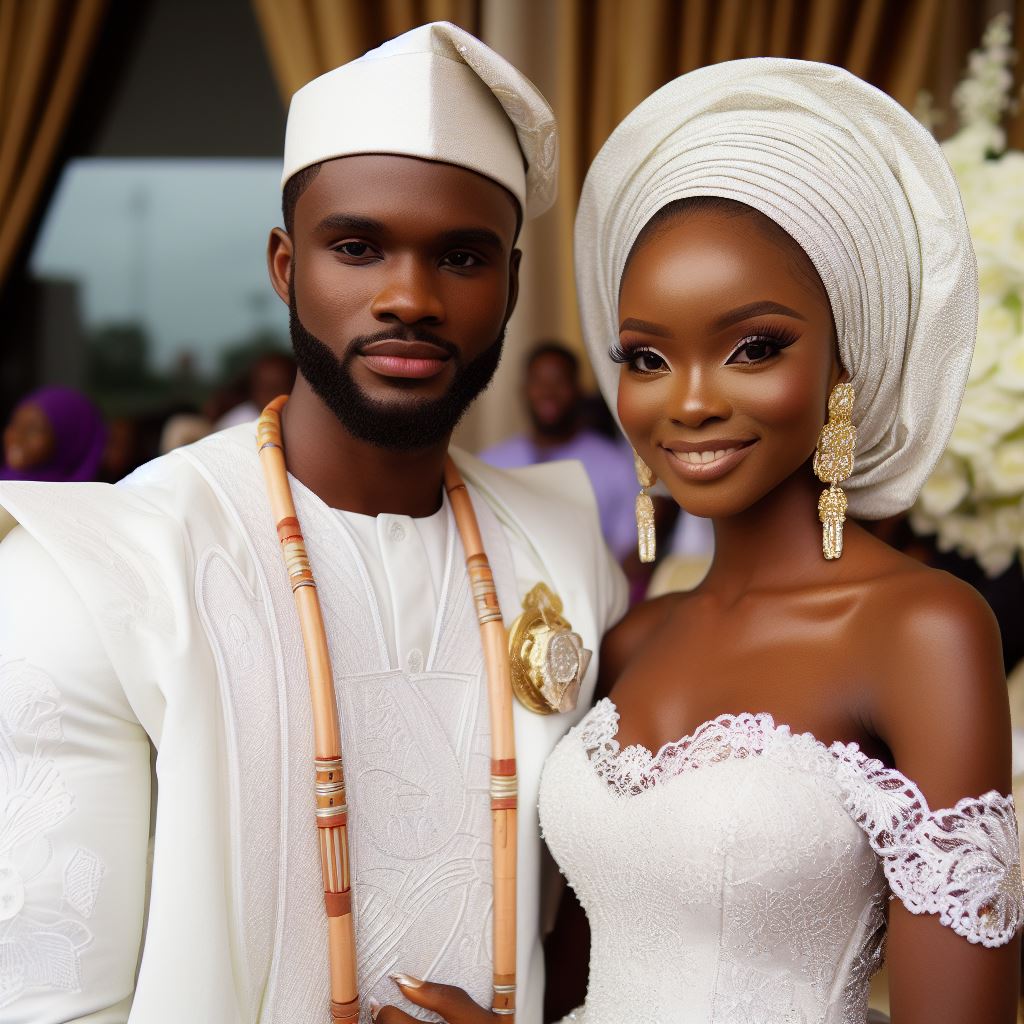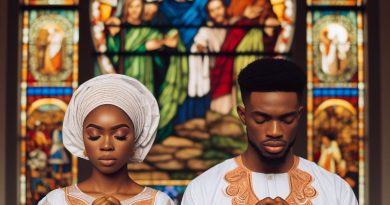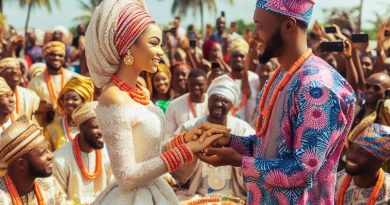The Evolution of Marriage Proposals in Nigeria: Past vs. Present
Last Updated on October 23, 2023
Introduction
Marriage proposals hold great significance in Nigerian culture.
Thesis statement: The evolution of marriage proposals in Nigeria has drastically changed, with notable differences between the past and the present.
Marriage proposals play a crucial role in Nigerian society, symbolizing the union of two individuals and their families.
In the past, proposals were often formal and elaborate affairs, involving the prospective groom seeking permission from the bride’s family.
However, in present times, proposals have become more personalized and intimate.
Previously, marriage proposals were a public event, often taking place in front of family and friends.
The groom would present gifts and demonstrate his worthiness to the bride’s family.
Today, proposals are more private, with couples choosing to have intimate moments away from prying eyes.
Traditionally, negotiations for dowry and bride price were common before a proposal could take place.
These negotiations were seen as a way to show respect and honor to the bride’s family.
However, in modern times, these practices have become less prevalent, with couples prioritizing their personal preferences over societal expectations.
The concept of surprise proposals is a recent phenomenon that has gained popularity in Nigeria.
In the past, proposals were carefully planned and discussed beforehand, ensuring the approval of both families.
Today, surprise proposals are seen as romantic gestures, reflecting the changing attitudes towards love and relationships.
In conclusion, the evolution of marriage proposals in Nigeria reflects the shifting cultural norms and societal values.
The past emphasized traditional practices and conforming to societal expectations, while the present focuses on personalization, intimacy, and romantic gestures.
Marriage proposals remain significant events, symbolizing the commitment and love between two individuals.
Traditional Marriage Proposals in Nigeria
Arranged marriages and their impact on proposals
- Limited agency for individuals in choosing their spouses.
- Parents take the lead in selecting potential partners based on social status and family background.
- Proposal process often initiated by the groom’s family, seeking the consent of the bride’s family.
- Lack of emphasis on personal compatibility and romantic love in these arranged marriages.
Cultural and traditional practices surrounding marriage proposals
- Importance of respect and honor in Nigerian culture.
- Elaborate pre-marriage rituals and ceremonies.
- Exchange of gifts and dowry to solidify the marriage proposal.
- Involvement of village elders to bless the union and seek their guidance.
Role of families and elders in the decision-making process
Families and elders have vital roles in orchestrating marriage proposals, granting approval and ensuring compatibility.
As Nigeria shifts from traditional to modern practices, here’s the evolution
- Traditionally, arranged marriages limited individual agency in selecting life partners, focusing on social status and family background.
- Proposals involved the groom’s family seeking the bride’s family’s consent, with romance as a secondary consideration.
- Cultural and traditional practices emphasized respect, pre-marriage rituals, gifts, dowry, and the involvement of village elders.
- Elders’ wisdom and blessings ensured a harmonious union.
Modern times reflect a balance between tradition and modernity
- Influences of globalization and modernization are reshaping marriage proposals.
- While some adhere to tradition, there’s a growing shift toward individualistic choices, emphasizing personal compatibility and romantic love.
- Younger generations voice their preferences, seeking partners who share their values and aspirations.
The evolution of Nigerian marriage proposals preserves heritage while embracing contemporary relationship dynamics.
Read: Best Times and Conditions to Recite Your Marriage Duas
Past Marriage Proposal Practices
Importance of dowry and bride price negotiations
- Dowry and bride price negotiations played a vital role in past Nigerian marriage proposals.
- Men would negotiate with the bride’s family to determine the dowry and bride price.
- These negotiations were seen as a way to validate the suitor’s seriousness and commitment.
- It was believed that the size of the dowry reflected the suitor’s ability to provide for the bride.
- If the negotiations were successful, the suitor would present the agreed-upon dowry to the bride’s family.
- Failure to meet the expectations of the bride’s family could lead to the rejection of the proposal.
- This process emphasized the financial aspect of marriage and reinforced traditional gender roles.
- Women were often seen as a valuable asset, and their worth was determined by the dowry.
- These negotiations also fostered a sense of unity between the two families.
- Marriage was seen as a union not just between individuals but also between families and communities.
The role of intermediaries in proposing on behalf of the suitor
- In past Nigerian marriage proposals, intermediaries played a significant role in proposing on behalf of the suitor.
- Intermediaries, often older and respected members of the community, would approach the bride’s family.
- They acted as representatives of the suitor, relaying his intentions and negotiating on his behalf.
- These intermediaries had to possess good communication and negotiation skills to persuade the bride’s family.
- The suitor’s identity would be revealed only after the intermediaries had successfully negotiated the proposal.
- This practice allowed for a formal introduction and ensured a level of respect and honor in the proposal process.
- Intermediaries served as ambassadors of the suitor’s family and helped establish trust and credibility.
- The involvement of intermediaries added a layer of formality and cultural significance to the marriage proposal.
- It also helped to maintain societal norms and traditions surrounding marriage.
- However, this practice often limited direct communication between the suitor and the bride.
Traditional engagement ceremonies and rituals
- Traditional engagement ceremonies and rituals were essential components of past Nigerian marriage proposals.
- These ceremonies provided an opportunity for the families to come together and formally acknowledge the proposal.
- A traditional engagement ceremony involved various rituals, symbolizing commitment and the union of two families.
- The exact rituals varied across different ethnic groups, but common elements included prayers, blessings, and exchanges of gifts.
- For example, the breaking of kolanuts and sharing of palm wine were significant in Yoruba engagement ceremonies.
- The bride and groom would wear traditional attire, showcasing their cultural heritage and identity.
- Elders and community members would offer advice and blessings to the couple.
- These engagement ceremonies reinforced cultural values and preserved ancestral traditions.
- They were seen as opportunities for bonding, celebration, and the strengthening of family ties.
- Today, while the nature and scale of engagement ceremonies may have evolved, they still hold cultural significance.
Read: Incorporating Marriage Duas in Your Wedding Ceremony
Factors Influencing the Evolution of Marriage Proposals in Nigeria
Globalization and exposure to Western ideals
- The increasing exposure to Western culture and ideas through globalization has had a significant impact on marriage proposals in Nigeria.
- In the past, marriage proposals were simple and less extravagant, but with the influence of Western ideals, they have become more elaborate and grandiose.
- People now strive to emulate the romantic gestures they see in Western movies and TV shows, leading to an evolution in the way they propose.
- Western ideas of romance and love have been adopted and integrated into Nigerian culture, leading to more elaborate and creative marriage proposals.
- Globalization has also made it easier for Nigerians to access information and ideas about marriage proposals from different parts of the world, inspiring them to think outside the box.
Changing societal norms and beliefs
- The evolution of marriage proposals in Nigeria can also be attributed to changing societal norms and beliefs.
- In the past, marriages were primarily arranged by families, and proposals were more of a formal announcement rather than a romantic gesture.
- However, as Nigerian society has become more individualistic and focused on personal choice and love, marriage proposals have evolved accordingly.
- Couples now have greater freedom in choosing their partners, and proposals have become a way for individuals to express their love and commitment.
- Changing gender roles and the empowerment of women have also contributed to the evolution of marriage proposals, with women now taking an active role in planning and executing them.
Influence of technology and social media
- The advent of technology and social media platforms has had a profound impact on the evolution of marriage proposals in Nigeria.
- Platforms like Instagram, Facebook, and YouTube have provided a platform for couples to showcase their creative and elaborate proposals to a wider audience.
- This has created a culture of competition, where couples strive to outdo each other in crafting the most romantic and viral-worthy proposals.
- Technology has also made it easier for couples to plan and coordinate elaborate proposals, with the help of event planners, photographers, and videographers.
- Social media has not only influenced the content and style of proposals but has also influenced the expectations and desires of individuals when it comes to their own proposals.
Read: Frequently Asked Questions about Marriage Duas Answered

Present-Day Marriage Proposal Trends in Nigeria
Rise of romantic gestures and personalization in proposals
In present-day Nigeria, marriage proposals have evolved to become more romantic and personalized.
Couples are no longer satisfied with traditional and mundane proposals.
Instead, they are opting for unique and creative ways to express their love and commitment.
Gone are the days when a simple question would suffice.
Now, prospective grooms go to great lengths to plan and execute memorable proposals that will leave their partners speechless.
From grand gestures like flash mobs and surprise trips to intimate settings with personalized touches, Nigerian men are putting their creativity on display.
Personalization plays a significant role in present-day marriage proposals in Nigeria.
Brides-to-be appreciate the effort put into tailoring the proposal to their interests, hobbies, and personalities.
For example, if a woman is a book enthusiast, her partner may plan a proposal in a bookstore with a custom-made book, inscribed with a proposal message.
Emphasis on mutual consent and communication between partners
Along with romantic gestures and personalization, present-day marriage proposals in Nigeria highlight the importance of mutual consent and open communication between partners.
It is no longer considered acceptable for a man to surprise his partner with a proposal without discussing their views on marriage.
Before popping the question, couples engage in deep conversations about their future, their goals, and their desire to embark on the journey of marriage together.
Both partners openly express their expectations, fears, and aspirations, ensuring that there is a strong foundation of trust and understanding before proceeding with the proposal.
Modern Nigerian couples recognize the significance of being on the same page before making a lifelong commitment.
Consent is sought not only from the woman but also from her family, as they believe in the importance of receiving blessings and support from loved ones.
Modern engagement ceremonies and celebrations
The present-day trend of marriage proposals in Nigeria also includes modern engagement ceremonies and celebrations.
These events are no longer limited to simple family gatherings but have transformed into elaborate affairs.
Couples now invest their time and resources in planning engagement ceremonies that reflect their style and personality.
These ceremonies often feature themes, elaborate decorations, and entertainment.
They aim to create a memorable and enjoyable experience for both the couple and their guests.
Engagement parties have also evolved to become more inclusive, with friends and extended family members being invited to celebrate the couple’s commitment.
It is seen as a way to foster closer relationships and build a strong support network as the couple prepares to enter married life.
In conclusion, present-day marriage proposals in Nigeria have witnessed a transformation driven by the rise of romantic gestures and personalization.
Couples emphasize the value of mutual consent and communication before making a lifelong commitment.
Additionally, modern engagement ceremonies and celebrations have become more elaborate, reflecting the individuality of the couple.
These trends signify a shift towards more meaningful and tailored proposals in the Nigerian context.
Read: Intimacy Issues: How Marriage Counselors in Nigeria Approach Them
Comparison of Past and Present Marriage Proposal Practices
Shift from arranged to love marriages
In the past, marriage proposals in Nigeria were primarily arranged by families based on social and economic considerations.
However, in the present, there is a clear shift towards love marriages where individuals have the freedom to choose their own partners.
This shift has led to a greater emphasis on personal compatibility and emotional connection in marriage proposals.
New focus on individuality and personal choice in proposals
Traditionally, marriage proposals in Nigeria were seen as a decision made by families for the benefit of the community.
Today, there is a growing emphasis on individuality and personal choice in marriage proposals.
Individuals now actively participate in the process and have the freedom to express their desires and preferences.
Proposals have become more customized and tailored to the unique qualities and interests of each couple.
Impact on gender roles and expectations within marriages
The evolution of marriage proposals in Nigeria has also had an impact on gender roles and expectations within marriages.
In the past, women had limited agency in the proposal process and were often seen as passive recipients.
Today, women are playing a more active role and have the power to initiate and be actively involved in the proposal.
This shift has challenged traditional gender norms and promotes equality and mutual decision-making within marriages.
In conclusion, the comparison of past and present marriage proposal practices in Nigeria highlights significant changes in societal attitudes towards love, personal choice, and gender roles.
The shift from arranged to love marriages has given individuals the freedom to choose their partners based on personal compatibility and emotional connection.
Marriage proposals now focus more on individuality, allowing couples to express their desires and preferences in a customized way.
Furthermore, the evolution of marriage proposals has led to a more equal distribution of power and decision-making within marriages, challenging traditional gender roles and expectations.
Overall, these changes reflect a more progressive and inclusive approach to marriage in Nigeria, promoting the importance of love, personal agency, and equality within the institution of marriage.
Conclusion
Recap of the evolution of marriage proposals in Nigeria
Throughout history, marriage proposals in Nigeria have transformed significantly.
In the past, they were simple and traditional, with a focus on family and community involvement.
However, in the present, proposals have become more elaborate and personalized, often incorporating modern elements and Western influences.
This shift reflects changing societal values and individual desires for romance and uniqueness.
Reflection on the importance of understanding these changes
Understanding the evolution of marriage proposals in Nigeria is crucial for both individuals and society as a whole.
It allows us to appreciate our cultural heritage while also embracing modernization.
By understanding these changes, we can appreciate the diversity and creativity behind marriage proposals, fostering more inclusive and accepting attitudes towards different ideas and traditions.
Final thoughts on the future of marriage proposals in Nigeria
As Nigeria continues to modernize and globalize, marriage proposals will likely continue to evolve.
It is important to strike a balance between honoring traditional values and embracing individuality.
The future of marriage proposals in Nigeria holds endless possibilities for creativity and personalization, catering to the unique desires and preferences of each couple.
With this, the institution of marriage will remain a vibrant and cherished aspect of Nigerian culture.


